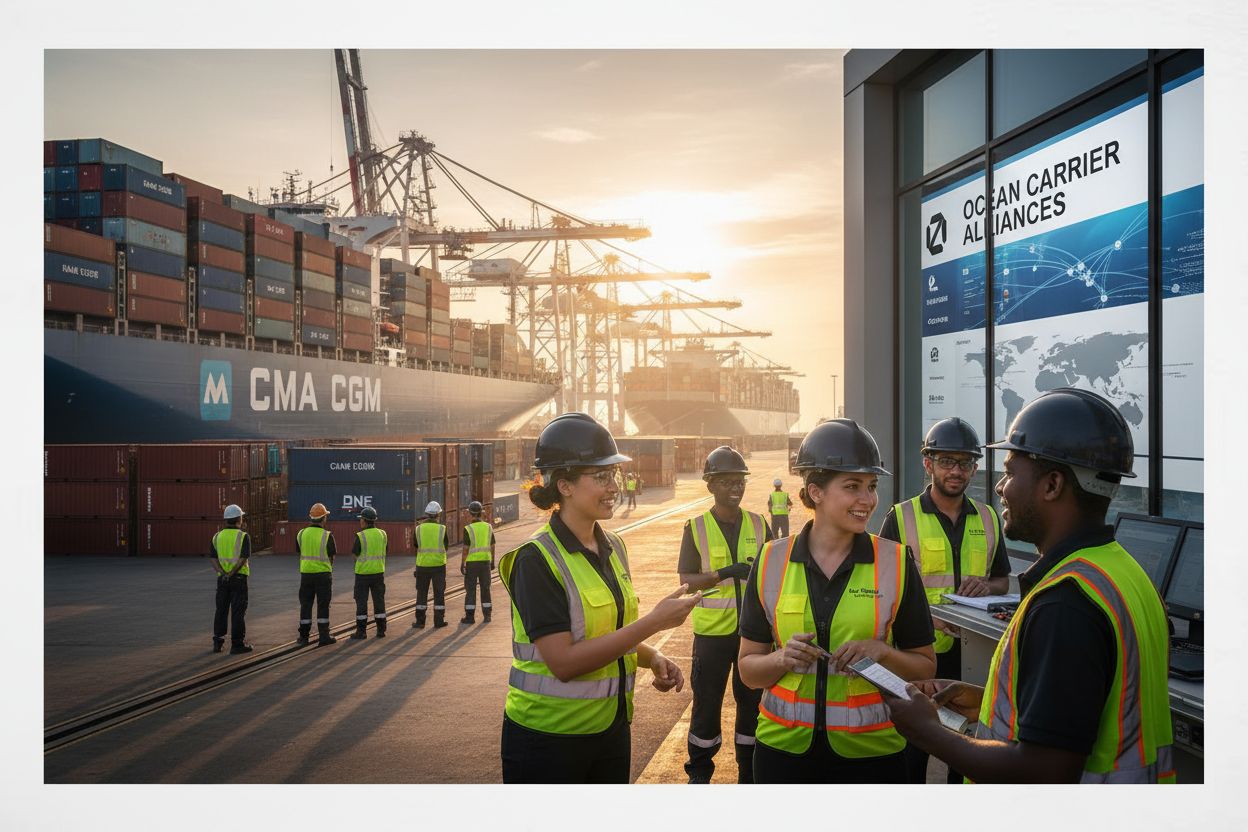Ocean shipping holds our world together. Most people do not realize that about 80 percent of global container shipping is run by just three powerful alliances. That sounds like cutthroat competition, but it is actually a story of unlikely partnerships. The biggest rivals team up and share ships to keep goods moving faster and cheaper than ever before. This surprising cooperation is behind nearly everything we buy.
Table of Contents
- What Are Ocean Carrier Alliances?
- Why Ocean Carrier Alliances Matter In Shipping
- How Ocean Carrier Alliances Operate
- Key Concepts Behind Ocean Carrier Alliances
- Real-World Impacts Of Ocean Carrier Alliances
Quick Summary
| Takeaway | Explanation |
|---|---|
| Ocean carrier alliances cut operational costs. | These partnerships allow companies to share vessel resources, reducing individual expenses significantly. |
| Shared vessels improve shipping efficiency. | By coordinating vessel routes, alliances enhance the reliability and speed of global shipping services. |
| Alliances expand global shipping coverage. | Collaborating enables shipping companies to offer more frequent and extensive service across various international routes. |
| Economic volatility is better managed. | Alliances allow companies to share economic risks, making them more resilient during market fluctuations. |
| Enhanced technology and resource sharing. | Joint efforts in operations lead to improved technological infrastructure and tracking systems, benefiting all members. |
What are Ocean Carrier Alliances?
Ocean carrier alliances represent strategic partnerships between major shipping companies that collaborate to optimize global maritime transportation networks. These collaborative arrangements allow shipping lines to pool their resources, share vessel capacity, and create more efficient global shipping routes. Ocean transportation services play a critical role in enabling these complex international trade networks.
The Strategic Purpose of Ocean Carrier Alliances
At their core, ocean carrier alliances are designed to address several fundamental challenges in the maritime shipping industry. By joining forces, shipping companies can:
- Reduce operational costs through shared vessel deployments
- Increase network coverage and frequency of routes
- Improve overall shipping efficiency and reliability
- Manage economic volatility in the global shipping market
The primary motivation behind these alliances is economic optimization. Shipping companies face enormous infrastructure and operational expenses, including vessel construction, fuel costs, maintenance, and crew management. By creating strategic partnerships, they can spread these substantial financial burdens across multiple organizations.
Structure and Operational Dynamics
Ocean carrier alliances typically involve agreements between 3 to 4 major shipping companies that coordinate their vessel routes, share container ships, and create joint service networks. According to Maritime Executive, these alliances now control approximately 80% of global container shipping capacity.
The most prominent ocean carrier alliances include the 2M Alliance (Maersk and Mediterranean Shipping Company), THE Alliance (Hapag-Lloyd, Ocean Network Express, and Yang Ming), and the OCEAN Alliance (CMA CGM, COSCO, Evergreen, and OOCL).
Below is a comparison table highlighting the structure and main members of the three major ocean carrier alliances, as discussed in the article.
| Alliance Name | Member Companies | Key Features |
|---|---|---|
| 2M Alliance | Maersk, Mediterranean Shipping Company | Shared vessel deployments, cost reduction |
| THE Alliance | Hapag-Lloyd, Ocean Network Express, Yang Ming | Coordinated vessel routes, operational efficiency |
| OCEAN Alliance | CMA CGM, COSCO, Evergreen, OOCL | Extensive route coverage, risk-sharing |
By strategically sharing vessels and routes, ocean carrier alliances create a more interconnected and resilient global maritime transportation system that benefits international trade and global commerce.
Why Ocean Carrier Alliances Matter in Shipping
Ocean carrier alliances are critical to maintaining global trade efficiency, reducing transportation costs, and addressing complex maritime logistics challenges. The importance of ocean transportation in global trade cannot be overstated, as these strategic partnerships fundamentally transform how international shipping operates.
Economic Impact and Cost Efficiency
The economic significance of ocean carrier alliances extends far beyond simple cost savings. These collaborative networks provide substantial financial benefits for shipping companies and, by extension, global trade participants. According to McKinsey & Company, alliance members can reduce operational expenses by up to 20% through coordinated vessel sharing and route optimization.

Key economic advantages include:
- Reduced vessel acquisition and maintenance costs
- Enhanced fuel efficiency through optimized routing
- Lower overall transportation expenses for global traders
- Improved capacity management during market fluctuations
Network Coverage and Reliability
Ocean carrier alliances dramatically expand global shipping network coverage, enabling more comprehensive and reliable international transportation routes. By pooling resources and vessel capacities, these partnerships can offer more frequent sailings, broader geographical reach, and more consistent service levels than individual shipping companies could achieve independently.
The strategic collaboration allows shipping lines to:
- Create more comprehensive global shipping networks
- Provide more frequent and reliable transportation options
- Quickly adapt to changing market demands
- Mitigate risks associated with individual operational limitations
Through these sophisticated partnerships, ocean carrier alliances have transformed maritime logistics from fragmented, competitive models to integrated, collaborative systems that enhance global trade efficiency and resilience.

How Ocean Carrier Alliances Operate
Ocean carrier alliances function through complex, carefully negotiated operational frameworks that enable seamless collaboration across multiple shipping companies. Ocean freight forwarding services play a critical role in understanding these intricate partnership mechanisms.
Vessel Sharing and Route Coordination
At the heart of ocean carrier alliance operations is a sophisticated system of vessel sharing agreements.
VIDEO:video_content] These arrangements allow member shipping lines to optimize vessel utilization by collectively deploying their container ships across global trade routes. According to [OECD research, this collaborative approach enables shipping companies to maintain individual commercial identities while jointly managing operational logistics.
Key operational strategies include:
- Coordinating sailing schedules across alliance members
- Exchanging vessel slots to maximize capacity utilization
- Developing integrated network route planning
- Sharing technological infrastructure and tracking systems
Slot Exchange and Capacity Management
Slot exchange mechanisms represent a critical component of alliance operations. In this process, shipping companies trade container slots on each other’s vessels, allowing for more flexible and efficient cargo transportation. This approach enables alliance members to:
- Access broader geographical coverage
- Reduce individual vessel operating costs
- Maintain consistent service frequency
- Quickly adapt to fluctuating market demands
By implementing these intricate operational strategies, ocean carrier alliances transform maritime logistics from a fragmented, competitive landscape into a collaborative, interconnected global transportation network that delivers unprecedented efficiency and reliability for international trade.
The following table summarizes the main operational strategies used by ocean carrier alliances, organizing the key elements covered in the article for greater clarity.
| Operational Strategy | Description | Benefit |
|---|---|---|
| Vessel Sharing Agreements | Member lines use each other’s ships across trade routes | Improved vessel utilization and cost savings |
| Slot Exchange | Trading container slots on vessels among alliance members | Broader coverage and flexible cargo movement |
| Coordinated Sailing Schedules | Aligning departures and arrivals for optimal service | More frequent and reliable sailings |
| Integrated Route Planning | Joint planning of global shipping routes | Expanded network coverage |
| Shared Technology & Resources | Access to common IT and tracking infrastructure | Enhanced service and efficiency |
Key Concepts Behind Ocean Carrier Alliances
Ocean carrier alliances represent sophisticated frameworks of cooperation that transcend traditional competitive business models in maritime shipping. Understanding these strategic partnerships requires examining their fundamental operational principles and economic rationales. Ocean freight forwarding services provide critical insights into these complex collaborative mechanisms.
Strategic Collaboration Framework
The underlying philosophy of ocean carrier alliances centers on collaborative competition. Shipping companies recognize that certain operational aspects benefit more from cooperation than individual competition. According to OECD research, these alliances function within regulatory frameworks designed to prevent anti-competitive behaviors while enabling members to reduce service duplication and invest in more advanced maritime infrastructure.
Key strategic collaboration principles include:
- Maintaining individual brand identities
- Sharing operational resources without compromising competitive positioning
- Creating mutually beneficial network efficiencies
- Developing standardized operational protocols
Economic Risk Mitigation
Economic risk management represents another critical concept driving ocean carrier alliances. By distributing financial risks across multiple organizations, shipping companies can better withstand market volatility, significant infrastructure investments, and unexpected global economic disruptions.
Risk mitigation strategies encompass:
- Spreading capital investment costs
- Reducing individual financial exposure
- Creating more resilient global shipping networks
- Enabling faster adaptation to market changes
These strategic partnerships transform maritime logistics from a purely competitive landscape into a collaborative ecosystem that enhances global trade efficiency, technological innovation, and economic resilience.
Real-World Impacts of Ocean Carrier Alliances
Ocean carrier alliances have profound implications for global trade, shipping economics, and international logistics infrastructure. These strategic partnerships fundamentally reshape how goods move across international waters. Drayage Crisis 2014 serves as a historical reference point for understanding the complex dynamics of maritime transportation networks.
Market Concentration and Competitive Dynamics
The emergence of ocean carrier alliances has significantly altered global shipping market structures. According to research from ResearchGate, these partnerships can simultaneously drive operational efficiencies and potentially concentrate market power among a limited number of carriers.
Key market transformation impacts include:
- Reduced number of independent shipping companies
- Enhanced collective negotiating power
- Potential limitations on individual carrier competition
- Increased standardization of shipping services
Economic and Operational Efficiency
Ocean carrier alliances generate substantial economic benefits by creating more streamlined and cost-effective shipping networks. By pooling resources and coordinating vessel deployments, these collaborative arrangements enable:
- Significant reductions in per-container transportation costs
- More consistent and predictable global shipping schedules
- Greater investment in advanced maritime technologies
- Improved environmental sustainability through optimized routing
These strategic partnerships represent a complex evolution in global maritime logistics, balancing economic efficiency with potential market concentration risks while fundamentally transforming international trade infrastructure.
Elevate Your Trade Success With Global Ocean Expertise
Struggling to navigate the complexities and unpredictability of ocean carrier alliances? As the article highlights, inefficiencies, limited access to reliable networks, and volatile shipping costs can hinder your global trade operations. When your business depends on secure routes, competitive pricing, and uninterrupted international shipping, you need a true partner who understands the shifting landscape of collaborative ocean freight. Worldwide Express provides solutions that ensure your cargo moves efficiently, even when industry changes and market risks arise. Benefit from our tailored logistics plans, global trade coverage, and seamless end-to-end support including customs, tracking, and compliance.

Stop letting alliance uncertainty disrupt your trade goals. Connect with Worldwide Express today through our main site and experience reliable ocean transportation services built around transparency and industry expertise. Our team is ready, so you can move forward confidently on the global stage. Let us help you transform your cross-border shipments into a competitive advantage now.
Frequently Asked Questions
What are ocean carrier alliances?
Ocean carrier alliances are strategic partnerships between major shipping companies that collaborate to optimize global shipping networks, reduce operational costs, and improve shipping efficiency.
How do ocean carrier alliances benefit shipping companies?
These alliances allow shipping lines to share resources, reduce costs, enhance route coverage, and improve overall operational efficiency, providing economic advantages and increased resilience in the shipping market.
What are the main operational strategies used by ocean carrier alliances?
Key strategies include vessel sharing, coordinating sailing schedules, exchanging container slots, and developing integrated route planning to maximize efficiency and adaptability in global shipping.
How do ocean carrier alliances impact global trade?
By optimizing transportation logistics and reducing costs, ocean carrier alliances play a crucial role in enhancing global trade efficiency, enabling more reliable supply chains, and fostering economic growth.






